
In today’s digital world, Michael McVety, president of Red Fortress Property Management in Fort Myers, understands that an optimized online presence is crucial. Relying solely on referrals from real estate agents is no longer enough.
Michael needs to ensure his business is easily discoverable online to reach clients facing urgent property issues, such as evictions or maintenance problems. This guide will explore how SEO can help connect its services with clients needing immediate assistance.
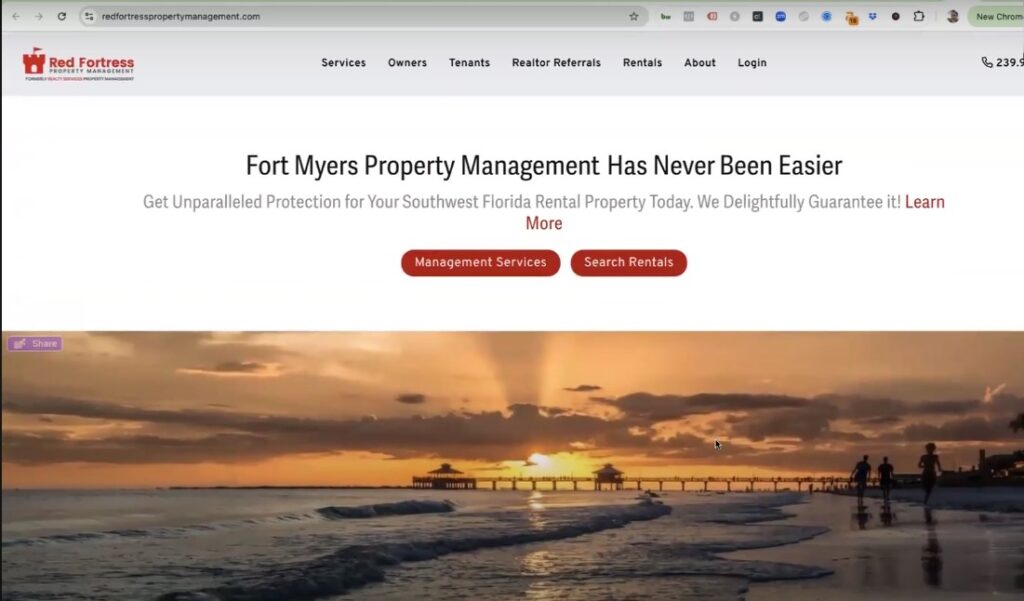
When reviewing the keywords Red Fortress Property Management ranks for, it’s clear that they are targeting key cities like Fort Myers and surrounding areas. They are already in a good position, with some keywords ranking around positions 7 and 8.
However, there are still smaller players in the market who are collecting business by handling property management issues like broken washers and dryers—things that clients need immediate help with. While Micheal’s site shows solid proof of his services, there are a few basic elements missing that are easy to fix. With the help of AI, he can quickly address these gaps and improve his online presence.
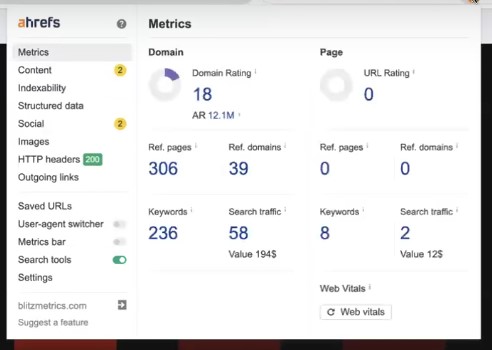
The site ranks for a couple hundred terms, but the Bonita Springs page targets only eight keywords. This means the page has limited SEO power and could benefit from optimization to enhance its effectiveness.
Adding location-specific pages like redfortresspropertymanagement.com/Fort-Meyers/Cape-Coral can significantly enhance his SEO footprint. AI tools like ChatGPT can help generate localized content, making it easier to expand the business’s online presence without overwhelming Michael.
His website is ranking around positions 10, 11, and 12, which means it is getting little to no traffic. To gain visibility, it needs to be in the top three, especially with the local three-pack, as only three businesses show up on the map for local services. The keyword difficulty for this is zero, making it easy to win.

For example, the Fort Myers Property Management page is essentially the same as the Bonita Springs Property Management page, with only minor differences. It is missing some key elements that could significantly boost its rankings.
The site relies heavily on generic stock images, which can hurt Michael’s credibility. For example, I ran a reverse image search on one of his photos, and it’s used on countless other sites. This makes his content look impersonal and unoriginal.
Replacing these images with authentic photos and videos would make a big difference. Capture visuals himself, especially ones that showcase Fort Myers or his specific properties. Even something as simple as a boarding pass from Southwest Airlines tagged with ‘Fort Myers’ adds authenticity. Real content resonates more with users and builds trust, setting you apart from competitors who rely on stock visuals.
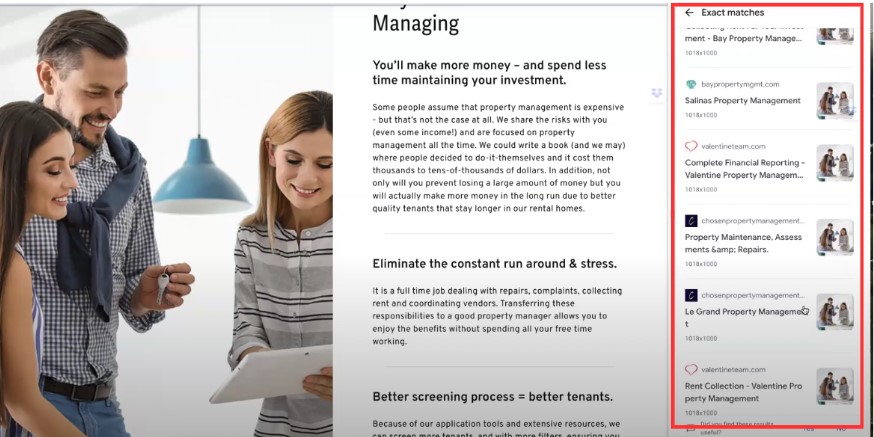
E-E-A-T (Experience, Expertise, Authority, and Trust)
Bonita Springs page, for example, currently ranks poorly because it lacks E-E-A-T elements and doesn’t target enough relevant keywords. To improve this:
- Enrich the content with local examples.
- Add internal links and reference authoritative blog posts.
- Use tools like Link Whisper and Rank Math for effective internal linking.
These steps will help Michael improve his SEO and establish greater authority in his field.
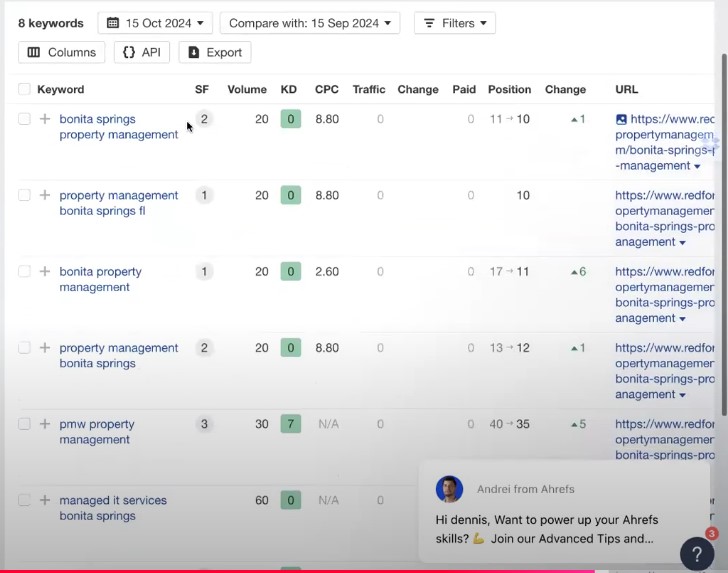
User Search Intent
AI tools can provide real-time SEO insights and improve content strategy. Michael should leverage AI to analyze “People Also Ask” (PAA) sections to uncover common client questions, which he can address directly on his site.
For instance, if you search for ‘Bonita Springs Property Management,’ you’ll see sponsored results and the local three-pack. However, there’s also a section for ‘People Also Ask,’ which reveals additional questions people are searching for.
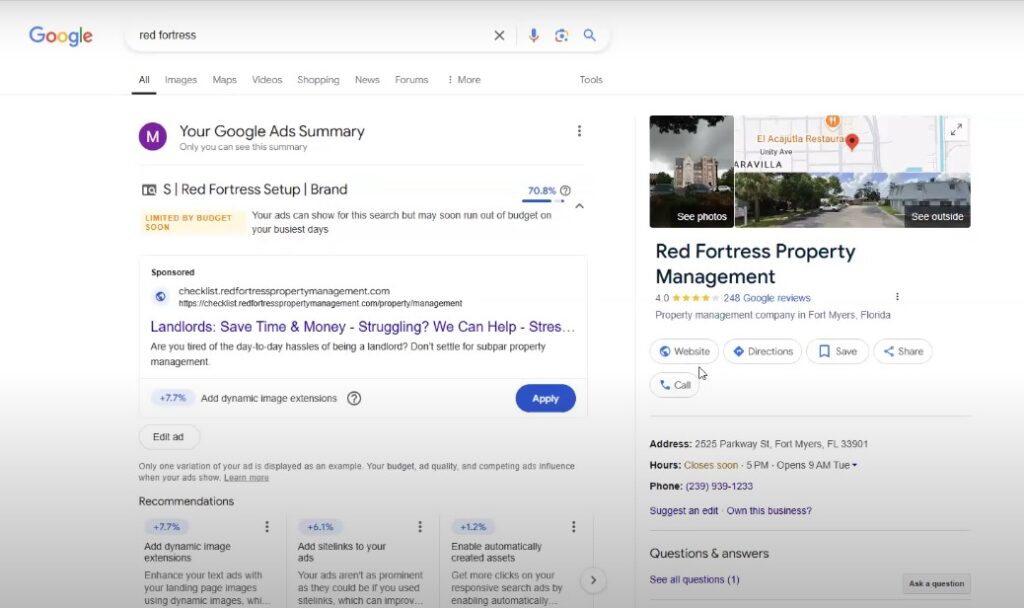
To improve its SEO, Micheal needs to answer these questions. For example, when someone searches for ‘Property Management in Bonita Springs,’ Google will show related questions, such as ‘Who are the biggest property management firms?’ Answering these questions directly on his website can help him rank better.
While it’s important to answer commonly asked queries, he should avoid mentioning competitors or irrelevant topics, such as job-related questions about property management salaries.

Creating short, one-minute videos that address these questions (e.g., tenant laws or maintenance tips) for specific cities like Bonita Springs, Fort Myers, and Cape Coral can further boost SEO. Ensure these videos are optimized with relevant titles, descriptions, and tags, and are uploaded to YouTube to reach a broader audience.
Focus on topics related to each city, such as property management tips or local insights. This strategy aligns with what Google wants—short, relevant, and targeted content that addresses search intent.
Expanding Content and Engagement through Social Media
A successful SEO strategy goes beyond website optimization. Michael should integrate podcasts and interviews with local businesses or clients into his content. These types of content add credibility, foster community connections, and enhance SEO. Distributing content across social platforms like LinkedIn, Facebook, and Twitter can drive traffic to the site and improve visibility.
Featuring clients and landlords in a podcast would boost his SEO while creating valuable content. A good podcast name might align with property management themes, like Rental ROI Success Stories in Southwest Florida or Fortress Real Estate Roundtable. He could also consider titles like Behind the Door or Investor’s Edge. These align with his audience and the content he wants to rank for, like property management in Fort Myers and surrounding areas.
The competition is low for relevant keywords, so it’s an easy win. He could interview landlords or investors, discuss local trends, and highlight their insights. Even quick three-minute videos would work, focusing on rental strategies, hurricane preparedness, or property maintenance tips.
For example, he mentioned Hurricane Milton—sharing stories about how it impacted properties versus Hurricane Helen could resonate with his audience.
These videos or podcasts would make the content relatable and build trust. They would showcase who he is and what his company stands for while adding an authentic touch to his SEO efforts.

Maximizing AI for Content Creation and Local Engagement
AI can assist in structuring responses to PAA questions and identify high-value content opportunities.
Start with the basics—getting clear on who you are and what you do. From there, we can focus on optimizing his SEO and creating localized service pages. As we dive deeper, the AI begins to work with more context and information. It’s like giving the AI more details, so it has to put in extra effort to provide better answers.
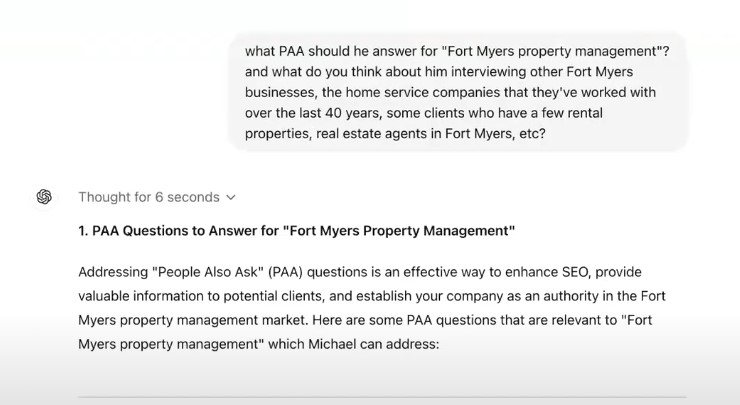
This approach isn’t about the AI being smarter or me being a search engine expert; it’s about layering in more information and making the AI go through more steps to get the best results. This tool can do the work for you, as long as you have the right ingredients.
For example, I could take videos you’ve already made, paste into the transcriptions, and build from there. Create more educational content, like one focused on the tax advantages of owning rental properties, which would be valuable for landlords.
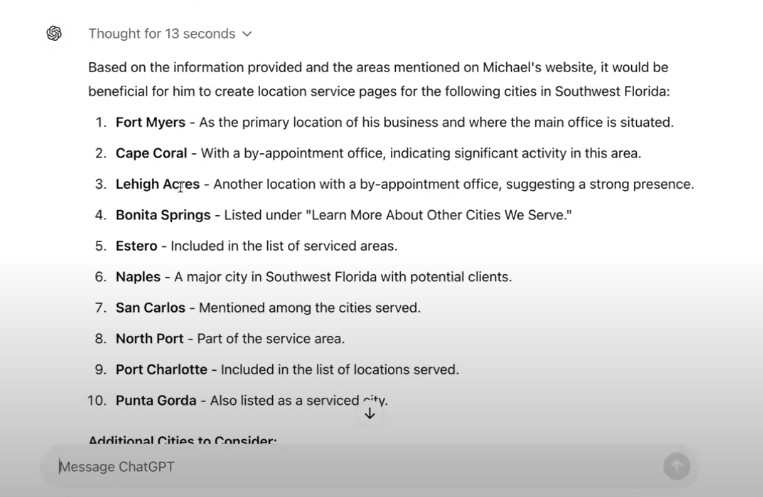
I recommend interviewing landlords in each of the cities, even if it’s just a 10-minute Zoom call. You can discuss local trends, taxes, and home ownership—this isn’t for testimonials, but to create genuine, informational content. This approach leverages their expertise, which, in turn, elevates your own SEO.
Automation and Delegation for Ongoing SEO Success
After implementing initial SEO strategies, Michael should focus on ongoing maintenance. This includes:
- Regular content creation to keep the site dynamic.
- Distributing content across social platforms.
- Building backlinks and strategic partnerships to improve domain authority.
AI tools can automate tasks like identifying new keywords, while Michael focuses on more strategic aspects of the business.
Pro tip: While landing pages are great for conversions, WordPress is essential for long-term SEO success. It allows for the creation of evergreen content—articles, guides, and videos—that continue to generate traffic and build authority over time.
Building Community Through Local SEO
By focusing on specific areas like Bonita Springs and incorporating local landmarks, Michael can ensure his content resonates with local clients. Collaborating with local businesses for interviews or features will increase engagement and trust, both of which are crucial for local SEO.
Michael likely works with real estate agents, mortgage brokers, and home service companies like roofers or pool repair specialists. These partners form his referral network, and featuring them on his podcast is a win-win. It gives them valuable PR and creates mutually beneficial exposure.
He should make sure to link these connections properly—avoid spammy tactics that could harm his SEO. Instead, follow best practices to build meaningful links. Embed podcast videos on the website pages; video content carries far more SEO power than blog posts.
While his blog and YouTube content are a great start, the lack of significant traffic has a limited impact. He should focus on creating engaging, video-driven content to strengthen his site’s authority.
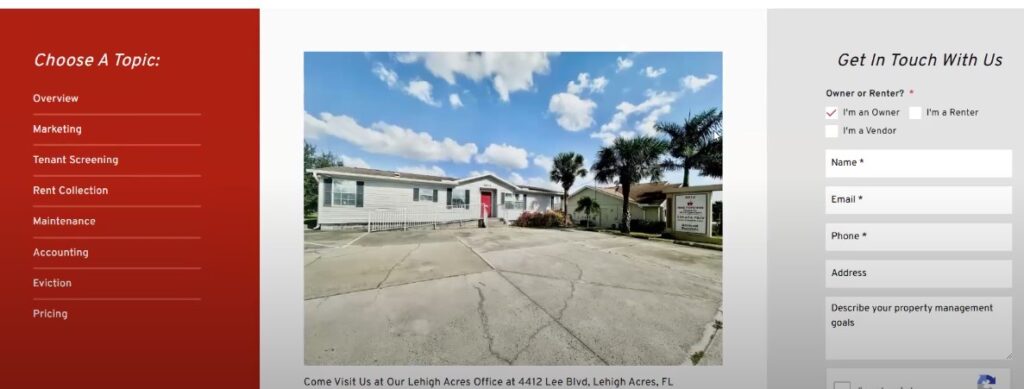
Conclusion: Establishing a Robust Online Presence
By implementing these SEO strategies, Michael can transform his website into a powerful tool that attracts and engages potential clients. It’s not just about ranking for specific keywords; it’s about creating a rich digital footprint that showcases expertise, builds authority, and connects directly with the local community.
Here’s a summary of what Michael needs to do to improve his website and expand the client base effectively:
- Ensure to have dedicated pages for every service location.
- Avoid generic content; make each page unique and detailed.
- Replace stock images with authentic photos from your locations (e.g., Bonita, San Carlos). Use images that reflect a connection to the community.
- Include personal anecdotes, local insights, and experience to create content with E-E-A-T.
- Show that you’re active in the local community through photos and videos.
- Feature his network of real estate agents, mortgage brokers, and service providers (roofers, pool companies, etc.) on his podcast. This creates mutual PR benefits, strengthens relationships, and boosts SEO with proper linking.
- Record videos discussing relevant topics, such as rental analysis and local market trends.
- Embed these videos on the site; they hold more SEO power than blogs.
- Include real-life examples and local factors to make the content relatable and engaging.
- Once the content is ready, promote it with a dollar-a-day strategy on YouTube.
- Identify and answer questions from the “People Also Ask” section on the site.
- Highlight his firm’s accomplishments: 40 years of experience, 150+ clients, and certified Master Property Managers.
- Use authentic visuals and testimonials to stand out from competitors.
By implementing these steps, he will strengthen his site’s authority, boost SEO rankings, and attract more clients through relatable, value-driven content.
Ready to take your website to the next level? Join Office Hours now for expert insights and actionable tips. Fast, efficient, and game-changing—let’s get started!
